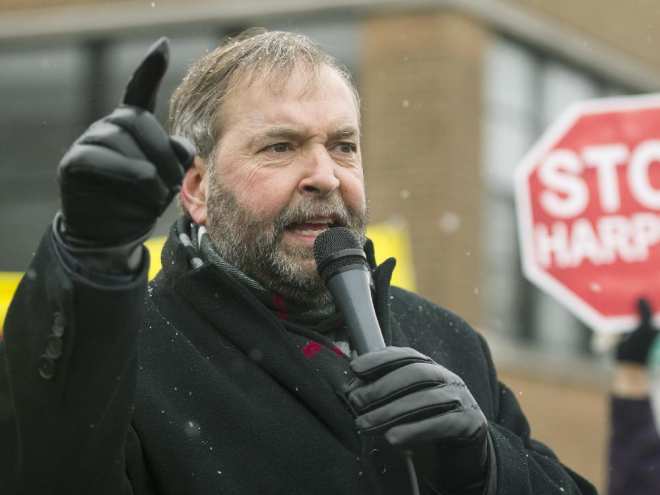Polls do not an election make, but in a contest of perceptions they can have a psychological impact. Which is why news that the federal New Democrats are leading the other parties for the first time since 2011 could remake the campaign before it begins.
The statutory disclaimer: this is one poll, taken after the stunning election of Rachel Notley’s New Democrats in Alberta, based on “preliminary numbers”. It shows the New Democrats nationally at 29.2 per cent, the Conservatives at 28.6 per cent and the Liberals at 27.6 per cent.
Given that the election campaign does not begin officially until September, when Canadians start paying attention, isn’t this premature?
Not necessarily. In the age of social media, numbers like this (even unconfirmed) matter. They signal shifting perception. Politics is all about perception, fair or unfair.
Consider some of the perceptions of the last two years, as reflected in the polls. One is that the government is secretive, sly and mean. Stephen Harper is smart and respected but dour and unloved. A second perception is that Canadians are ready to defeat the Conservatives – if they have an alternative. They aren’t angry but open to persuasion. A third perception is that the party most likely to win is the Liberals, whose brand is strong. They hold power in Canada’s three largest provinces and three others. A fourth perception is that the Liberals, more than New Democrats, are the choice of progressives. The Liberals are the government-in-waiting.
This has been the story for the last two years. While the Liberals and the Conservatives have jockeyed for first place, the NDP has remained a distant third.
As long as the New Democrats languished there, the Liberals could argue powerfully that they were the only choice of progressives – from former Progressive Conservatives to lapsed Liberals to soft Greens to pragmatic New Democrats who loathe Stephen Harper more than they love Tom Mulcair. That appeal has helped the Liberals raise money and attract members.
Led by a youthful retail politician, surrounded by strong candidates, embracing a catchy idea or two (firing Liberal senators, legalizing pot), Justin Trudeau’s Liberals had finely positioned themselves as the successor to Stephen Harper’s Conservatives. If not this election, they hoped, the next, after holding the Conservatives to a minority.
In this narrative, the 2011 election (the worst defeat for the Liberals in their history, the best result for the NDP) was an aberration. As long as they continued to lead the polls, the Liberals could argue that the country was returning to alternating power between the Liberals and the Conservatives, with the NDP as also-ran.
But if this poll is correct, that is changing now – and it could change everything in the fall.
If the New Democrats go into September leading the Liberals, it is they who can claim to be the progressive alternative. They can say, as the Liberals have, that they are the only choice among moderates to dislodge the Conservatives.
The NDP victory in Alberta does not mean an ideological sea-change there, just that voters trust New Democrats with power in a big, rich province (after rejecting them in BC and Nova Scotia). Perception, perception.
Mulcair may not be cuddly but he is effective in Parliament. His principled critique of the anti-terrorism bill – admired by many Liberals – is one reason that public support for the bill has fallen sharply.
In the battle of perception, Trudeau needs new tactics. Fast. He has to show that he is thoughtful, substantial and capable of running a big country. He has to be more natural and less halting than he was talking about the economy – punctuated by umms – at the Empire Club of Canada recently. He has to find a rhythm beyond the teleprompter (a speech coach would help) and weave a storyline, urging Canadians, for example, to take back their country from fear and nastiness.
If he doesn’t, his party will falter and progressives will split evenly between him and Mulcair, creating new three-way races. And the Conservatives will win again.
Cohen: NDP making gains in fight for progressive voters
































Laissez un commentaire Votre adresse courriel ne sera pas publiée.
Veuillez vous connecter afin de laisser un commentaire.
Aucun commentaire trouvé